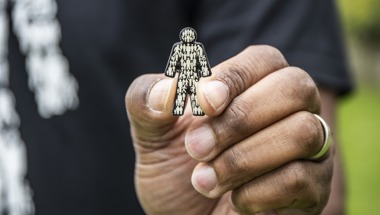Research
10 Sept 2025Faster MRI scans for prostate cancer are just as accurate, helping more men access one
Research we funded in partnership with the John Black Charitable Foundation could make prostate MRI scans quicker and cheaper, meaning less time in hospital and shorter waiting times for men with suspected prostate cancer. We’re urging NICE to review its MRI guidelines – a vital step towards faster scans being available on the NHS.

Men with suspected prostate cancer could soon find getting an MRI less time-consuming and easier to access as our research shows a quicker scan is just as good at detecting the disease as the current standard.
The quicker MRI scan takes around a third less time, cutting the time men would have to spend in hospital undergoing a scan. Taken across thousands of men, the time savings would also mean more men could be scanned each year – cutting their wait to get a diagnosis and begin treatment.
Importantly, the shorter scan can be performed on existing scanners, meaning it could be introduced quickly on the NHS.
Following these results, we’re urging NICE – the organisation that decides what treatments and technologies should be available on the NHS – to review the evidence on MRI scans for prostate cancer, and decide whether the NHS should use the shorter scans instead.

Increasing demand for prostate MRI
An MRI scan is a vital part of the way prostate cancer is diagnosed, enabling doctors to pinpoint where a biopsy should be targeted to test cells for the presence of cancer.
It also benefits men who don't have prostate cancer, enabling them to avoid a biopsy if their MRI scan is clear.
However, increasing demand for MRI scans means not all men can access one promptly – and this demand will only increase further if a screening programme for prostate cancer is introduced.
Our TRANSFORM trial, which aims to get the evidence for the best way to screen men for prostate cancer, will consider multiple screening options, including fast MRI scans.
Faster scans find just as many cancers
The current gold standard MRI, known as multiparametric MRI (mpMRI), was introduced across the UK thanks in part to research we funded back in 2008.
It combines data from three different scans to give a detailed picture of the type and structure of cells inside the body. Radiologists use this information to assess whether a man is likely to have cancer and, if so, refer him for a biopsy.
However, the three-part mpMRI scan takes some time, with the third stage involving a dye injection that needs to be given by a professional and can cause mild side effects.
A scan that skips the injection stage could therefore save time and reduce the burden on men, while costing the NHS almost 50 per cent less than an mpMRI. This two-stage scan is called biparametric MRI, or bpMRI for short.
This latest research, called the PRIME trial, tested the two types of scan on 490 patients with suspected prostate cancer from 12 countries around the world.
All the men underwent a full (three-stage) mpMRI scan, but radiologists were asked to analyse the results twice: the first time based on the two-stage scan results, then again once they were given data from all three scans.
These two analyses showed that the shorter bpMRI scan was just as effective as the longer mpMRI one: both scans found that 29 per cent of the men had prostate cancer that needed treatment.

New MRI scans on the NHS
The results, now published in the Journal of the American Medical Association, suggest the NHS could safely introduce shorter bpMRIs for diagnosing prostate cancer.
Another trial of bpMRI, called PACIFIC, is currently underway and should add even more evidence to strengthen the argument for bpMRI.
That’s why we’re asking NICE to start reviewing the evidence for using bpMRI now, so it can be ready to roll out bpMRI once the evidence from PACIFIC is available.
In the meantime, hospitals can prepare for faster MRIs by making tweaks to further improve the quality of their scans, since a two-stage MRI is even more dependent on scan data being top-quality.
In setting up the PRIME trial, the team showed these adjustments are simple to make, and can vastly improve MRI image quality.
If we can do the scan in up to half the time, with fewer staff and at lower cost, that will make a huge difference in allowing every man who needs a scan to be able to get one in a timely fashion.
Enabling every man to get a timely scan
Associate Professor Veeru Kasivisvanathan, lead researcher and chief investigator on the trial, said: "Currently around four million MRI scans are needed each year globally to diagnose prostate cancer. This demand is set to rise rapidly with a predicted surge in prostate cancer cases over the next 20 years.
"Time, cost and staff availability are all limiting factors in how many scans can be offered, which makes the results of the PRIME trial particularly important. If we can do the scan in up to half the time, with fewer staff and at lower cost, that will make a huge difference in allowing every man who needs a scan to be able to get one in a timely fashion."
Important step in the right direction
Dr Matthew Hobbs, Director of Research at Prostate Cancer UK, said: "The results from the PRIME trial, showing that a faster, cheaper, type of prostate MRI is just as good as the current standard MRI at detecting prostate cancer, are a hugely important step in the right direction for making MRIs more efficient.
"Another trial is already happening in the UK and the results of the two trials together should provide the complete evidence package we need to change practice across the country. We encourage NICE to prepare to review their guidelines as soon as that evidence base is complete, so that we can make MRI quicker, cheaper and less onerous for men.
"Our funding for PRIME, alongside the John Black Charitable Foundation, also provided recommendations of a few simple ways for hospitals to improve scan quality. So, while we await a review by NICE, hospitals should use guidelines from UCL's GLIMPSE trial, so that they are ready for the implementation of bpMRI if it's recommended, and so that the men having MRI scans right now get the most accurate scan possible."







